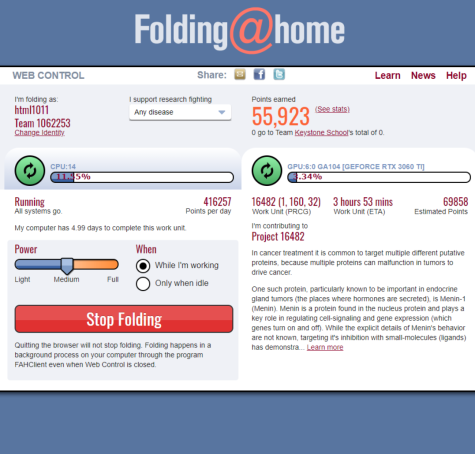Contribute to the Most Powerful Supercomputer on the Planet!
Supercomputers are humanity’s way of getting ahead. When talking about the COVID-19 virus, we can’t even compete from an evolutionary perspective to a virus that can hijack a cell and make up to 100,000 copies of itself at once. In order to create treatments for viruses such as SARS-CoV-2, we need to simulate the proteins composing these viruses in order to understand them and create potential treatments, which is incredibly difficult considering that proteins can be folded an infinite number of ways (a complex issue known as the protein folding problem).
Folding@home (also known as FAH, or F@H) is the fastest supercomputer in the world, and it essentially is a distributed computing project in which people around the world can contribute a fraction of their computer’s power to solve a work unit (WU).

There are a bunch of other distributed computing projects, why contribute to FAH?
FAH shows a lot more promise than other distributed computing projects; along with being supported by companies like Microsoft, AMD, and NVIDIA, FAH works to parallelize intrinsically serial calculations (calculations that need to be done step-by-step) using Markov State Models, their software shows you what advancements you’re contributing towards with your WU you’re completing, and they frequently release their results in peer-reviewed papers. Recently, FAH researchers have been working on a COVID Moonshot project to develop “a patent-free, low-cost oral antiviral drug effective against SARS-CoV-2” that could be approved as early as the beginning of 2022.
How can I help?
You can get started in as little as two minutes by installing their software here. You can view the work units your CPU and GPU have been assigned to at the local URL [email protected], as well as create a profile and join other teams competing to complete the most work units. You can also configure the amount of power FAH uses: by default, it’s set to run while you’re working at medium power, although if you’re looking to do some computationally intensive work (gaming, running a virtual machine, etc.) at the same time or conserve your battery, you can stop your computer from folding by either manually stopping FAH from folding or setting it to only run when idle. I would recommend using this software either on a desktop or a laptop connected to power not at school; this software can easily eat up battery power, albeit for a good cause.
What specifically am I doing by running this?
Not only are you contributing to the world’s fastest supercomputer, but you are also directly contributing to finding treatments for cancer, SARS-CoV-2, Alzheimer’s disease, Huntington’s disease, and others. On the Folding@home client interface, you can see the specific work unit you’re contributing to, as well as a full summary of the project. For example, the current project my CPU is completing a work unit for is working to understand why the protein ApoE is strongly correlated with Alzheimer’s disease.
How fast is Folding@home?
As of March 2020, Folding@home is faster than the world’s top 7 supercomputers combined. It now has over 470 petaflops of computing power; to put that into perspective, it is capable of performing 470 quadrillion (470,000,000,000,000,000) mathematical operations per second, slightly faster than the average computer. To even have an idea of how insanely large that is, this is a stack of one quadrillion pennies:

And now imagine 470 of those stacks. Each of these pennies represents a single mathematical operation like 1+1; Folding@home collectively can go through all of those pennies in a second.
What about points?
As if aiding in treating serious illnesses wasn’t enough, Folding@home has a points system to further incentivize users to maximize their contributions. If you wish to contribute to Folding@home, you can join Keystone’s unofficial team by entering our team number, 1062253, when creating your identity!

Sarah is a current senior at Keystone with a passion for all things concerning Computer Science, Computational Biology, and Artificial Intelligence....

